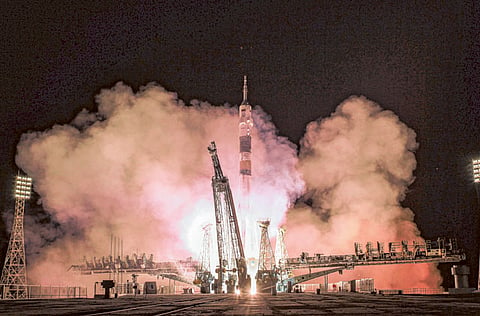New crew takes express ride to space station
Spaceship’s under-six hour journey is swiftest-ever manned trip to laboratory

Moscow: A new Russian-American crew arrived at the International Space Station (ISS) on Friday after a fast-track trip from Earth of under six hours, the swiftest ever manned journey to the orbiting laboratory.
A Nasa astronaut and two Russian cosmonauts opened the hatches of their Soyuz-TMA spaceship and floated into the ISS to a warm welcome from the three incumbent crew, live pictures broadcast on Russian television showed.
Russia’s Pavel Vinogradov and Alexander Misurkin and American Chris Cassidy are now expected to spend the next five months aboard the station after their hitch-free launch and docking.
Their record-breaking trip from blast-off at Russia’s Baikonur cosmodrome in Kazakhstan to docking with the ISS lasted less than six hours, slashing the usual travel time by some 45 hours.
Previously, trips to the ISS had taken over two full days as spaceships orbited the Earth 30 times before docking with the space station.
New technique
However, under a new technique now employed by the Russian space agency with the help of new technology, the Soyuz capsule this time only orbited Earth four times before docking.
After blast-off at 2043 GMT on Thursday (12.43am local time on Friday), the Soyuz capsule docked with the ISS at 0228 GMT with the hatches opening just over two hours later.
The quick journey — dubbed by Nasa’s official television commentator as a “chase into space” — has been made possible by launching the Soyuz just after the ISS passes overhead in orbit.
After reaching orbit, the Soyuz capsule then had just over 1,600 kilometres to make up to catch up with the ISS, which the Soyuz achieved with newly-improved thrusters and manoeuvring.
The manned “express” flight comes after Russia successfully sent three unmanned Progress supply capsules in August, October and February to the station via the short six hour route rather than two days.
Huge boost
The successful fast-track voyage is a huge boost for the embattled Russian space programme, whose reputation has been battered by several failed satellite launches in the last year.
However, there have been no problems to date with the manned spaceflight programme.
After the retirement of the US space shuttle, Russia is now the sole nation capable of transporting humans to the ISS.
Ahead of the launch, the crew expressed satisfaction with the new fast-track schedule, including Vinogradov who at 59 is one of Russia’s most experienced cosmonauts.
Vinogradov, who spent 197 days on board Russia’s now defunct Mir space station in 1997-1998 and also flew to the ISS in 2006, said the shortened flight time has several advantages for the crew.
Firstly, as the crew only start to experience the tough effects of weightlessness after 4-5 hours of flight, they will be in better shape when they arrive at the station for the docking procedure.
Sign up for the Daily Briefing
Get the latest news and updates straight to your inbox



